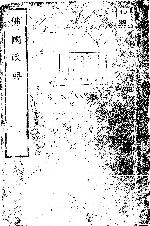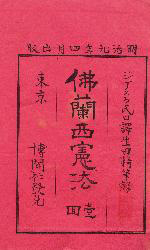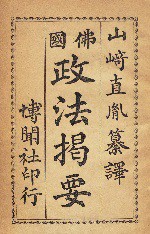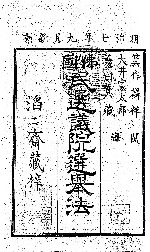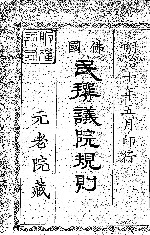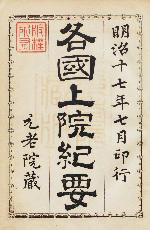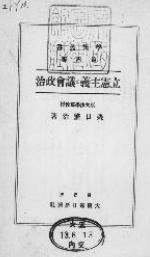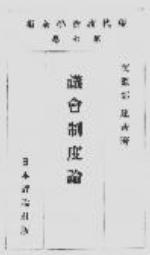![]()
Chapter 1: Politics and law
Section 4: The development of the constitutional government
In response to the sudden rise of the Freedom and People's Rights Movement, the government enacted the Press Ordinance of 1875 and the Libel Law of 1875, attempting to inhibit them by restricting speech, however the Imperial Edict of Incremental Establishment of the Constitutional Government was announced and the constitutional government came to be incrementally accepted. However, thereafter the attempt by the Genroin to compile a constitution ended in frustration.
After OKUMA Shigenobu (1838-1922) and others were dismissed in the Political Crisis of 1881, the imperial mandate on the establishment of the Diet was issued. In response, ITO Hirobumi (1841-1909) travelled to Germany and studied the Constitution of Prussia, and INOUE Kowashi (1843-1895) and others were charged with drawing up draft constitution. The constitution enacted based on this, was the Constitution of the Empire of Japan. This constitution was promulgated in 1889, and the 1st session of the Imperial Diet was held the following year. The influence of Germany in the constitution is conspicuous, however the influence of French public law and constitutional law in the establishment process cannot be ignored.
The influence of French public law
Émile Delacourtie, ŌI Kentarō and MITSUKURI Rinshō (Tr.), Futsukoku seiten, Shihōshō, 1873 [15-22] 
The history of Émile Delacourtie (birth and death dates unknown) is mostly unknown. OI Kentaro was the translator. On the orders of SOEJIMA Taneomi, ETO Shimpei and others, MITSUKURI Rinsho worked on the translations of a number of French laws including the Criminal Code and Civil Code (Furansu Hōritsusho [CF2-3-07], etc.) and is thought of as the founder of French law research. It is also said that MITSUKURI was the first to use the Japanese word kenpo as a translation for "Constitution". This text was also translated on ETO's order, and is divided into a total of 4 parts; part 1 is on national law (constitutional law), part 2 is on political law (administrative law), part 3 is on private law (Civil Code) and part 4 is on criminal law, and provides a large amount of annotation.
Albert Charles Du Bousquet, IKUTA Kuwashi (Tr.), Furansu kenpō, Hakubunsha, 1876 [特39-77] 
From the 18th century onward, a number of constitutions were established in France. This text is a translation of the Constitution of 1791, which was the first written constitution of France. This constitution employed a constitutional monarchy, unicameral system diet and limited voting based on tax amounts. Albert Charles Du Bousquet (1837-1882) was a Belgium born soldier. He came to Japan in 1867 as a member of the 1st French military adviser group. He continued to work on translation of French law, revision of the unequal treaties, the establishment of an army and the Genroin drafting of a constitution after the collapse of the Edo Shogunate. He has a Japanese wife and child, and was intered in Aoyama cemetery after dying in Japan. In addition, the translator IKUTA Kuwashi (1830-1881) also worked on the compiling of the Civil Code and was the editor of the Zenkoku Minji Kanrei Ruishū [24-71] which surveyed customs from throughout the country.
YAMAZAKI Naotane (Ed.&Tr.), Futsukoku seihō keiyō, Hakubunsha, 1878 [31-165] 
This text was translated and compiled at the order of Prince ARISUGAWA Taruhito (1835-1895), head of the Genroin and is composed of selected works by Delacourtie and others from the Second Empire. Volume 1 discusses legislative power and executive power (the executive power of the emperor and the prime minister), volume 2 discusses administrative affairs and various administrative agencies (including local autonomies and the military), and volume 3 discusses separation of the 3 branches of government and administrative litigation. This shows that there focus was placed on separation of the 3 branches of government from early on.
YAMAZAKI Naotane (1853?-1918) was a bureaucrat born in Buzen (Oita Prefecture). After visiting France in 1872 to study industrial technologies, he worked as a legal affairs officer, etc., and accompanied ITO Hirobumi on his visit to Europe. In addition to this work, he also translated the Code Napoleon Annotated [36-63] and his other works include Hikoku Kenpō Shakugi [5-69].
Until the establishment of the Imperial Diet
ŌI Kentarō and MINODA Shinzō (Tr.), MITSUKURI Rinshō (Review), Futsukoku minsen giin senkyohō, Tōtōsai, 1874 [CF2-251-01] 
After the outbreak of the French Revolution, the country went through a period of republicanism and Napoléon's imperial rule before the monarchy was restored. During the Restoration and July Monarchy limited voting was implemented based on property. As a result of the 1848 February Revolution republicanism was declared, and in March of the same year Universal Manhood Suffrage was introduced. However, the Second Empire did not continue long, suffering a coup d'etat by president Louis-Napoléon Bonaparte (1808-1873), and the Second Empire began the following year.
This text is a translation of the French Election Decree of 1852. This election method used Universal Manhood Suffrage, secret ballots, and a single seat constituency double vote system, which was mostly used during a period overlapping the Second Empire. In 1874, when this text was published, the Franco-Prussian War had already ended in defeat and the Second Empire had collapsed, however it was still a period where the Third Republic was fluid.
Albert Charles Du Bousquet (Tr.), HOSOKAWA Junjirō (Review), Futsukoku minsen giin kisoku, Genrōin, 1877 [BF2-2-01] 
The Freedom and People's Rights Movement demanded the establishment of a national assembly elected by the people, however parliamentary procedure was necessary for the Diet. This text is a translation of the French parliamentary procedure of 1849, created by the Genroin, which was established in 1875 as an imperial nominated legislative body. Parliamentary procedure differs by country, for example, the parliament of Britain does not completely lack codified parliamentary procedure, but does rely a great deal on precendent and prior practice, while the French parliament was operated mainly based on codified parliamentary procedure.
HOSOKAWA Junjiro was a law scholar and educator born in Tosa (Kochi Prefecture). After studying Dutch studies, English and other topics, in 1869 he served as vice-principal of Kaisei Gakko. Around this time, he drafted the Press Ordinance of 1869 and Publication Ordinance of 1869. In 1871 he was dispatched to the United States, and after returning to Japan he worked on the compilation and review of various laws and was also involved in the compilation of the Old Civil Code. Thereafter he served as a member of the House of Peers and privy councilor.
Genrōin (Tr.), Kakkoku jōin kiyō, Genrōin, 1884 [36-26] 
This text is a manual explanation created by the Genroin explaining the systems of the upper houses of a number of countries, including France. In France, from the time of the 1789 revolution until the third republic, both unicameral systems and bicameral systems were seen, however this text provides an outline of the organization and authorities of the upper houses that existed during this time. The Genroin succeeded the project of drafting a constitution from the Sain. The Proposal for a Japanese National Constitution drafted by the Genroin was divided into 8 volumes, with the 1st proposal lacking a national assembly elected by the people, however in the 2nd proposal in 1878, the House of Representatives was prescribed, for a bicameral system. Thereafter, the 3rd proposal was completed and met with opposition from IWAKURA Tomomi and others, and in the end was not adopted. With the enactment of the Constitution of the Empire of Japan, the Genroin was abolished in 1890, and the House of Peers was established as the upper house.
The constitutional government from Taisho onwards
MORIGUCHI Shigeji, Rikken shugi to gikai seiji, Ōsaka mainichi shinbunsha[et al], 1924 [515-109-(4)] 
After the enactment of the Constitution of the Empire of Japan, constitutionalism was again debated under the Taisho Democracy.
MORIGUCHI Shigeji (1889?-1940) was a legal scholar and political scientist who was active from the Taisho Era to the beginning of the Showa Era. He was a professor at the Imperial University of Kyoto. In addition to working on a joint translation of Rousseau's Social Contract (Min'yakuron [382-122]), his works also include Hirei Daihyōhō no Kenkyū [530-179. In 1933, when the works of Imperial University of Kyoto professor TAKIGAWA Yukitoki (1891-1962) were prohibited from distribution and he was dismissed and SASAKI Soichi (1878-1965) and others stepped down, he transferred to Ritsumeikan University.
This text was one of the earliest books to have used the word "constitutionalism (rik'ken shugi)" in the title, and is from the time after his study in France. The work states that constitutional government is "government by the will of the people" and "government by law", and continues to be "responsible government" by the ministers to the diet, today the law is not simply something that restrains the individual, but also something that restrains the rulers. There are some missing parts in the materials held by the NDL.
MINOBE Tatsukichi, Gikai seidoron, Nihonhyōronsha, 1930 [314-M513g] 
MINOBE Tatsukichi (1873-1948) was a leading constitutional law scholar from the prewar period. He was born in Hyogo Prefecture. After graduating from the Imperial University of Tokyo, he was employed at the Ministry of Home Affairs and studied in Britain, Germany and France. He later worked as a professor at the Imperial University of Tokyo. From the late Meiji Era, he advocated the Emperor-as-Organ-of-the-State Theory, which became the accepted theory in academic and official circles, but was attacked by the right wing at the beginning of the Showa Era.
This text provides outlines of the parliamentary systems of various countries, states that "While the French Revolution was directly set in France, it did not directly lead to the establishment of liberalistic government in France, it did have an influence on the development of liberalism in later generations around the world", and also provides a very high standard of explanations on the budget and right to ask of the French parliamentary system.
MINOBE's pupil, MIYAZAWA Toshiyoshi (1899-1976) blazed the trail for constitutional law historical research with his new translation of Montesquieu's The Spirit of the Laws [569-14], and was active as a leading constitutional law scholar after the Second World War.

